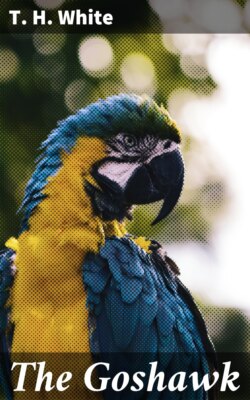Читать книгу The Goshawk - T. H. White - Страница 8
На сайте Литреса книга снята с продажи.
Thursday
ОглавлениеTable of Contents
A keeper of long-winged hawks used to be called a falconer, of short-winged hawks an austringer. The word was derived from the same root as ostrich, the biggest of birds. The training of the goshawk, the largest European short-winged hawk, might be expected to last about two months. In this time an ungovernable creature would have been taught to do, under government, what it would instinctively have done in two or three days in a free state. Two months was a long time.
What a goshawk learned in one day would rarely be appreciable to anybody but its master, so cautious and delicate was the progress, and the real difficulty of writing a book upon the subject would be to know which detail ought to be left out. I had decided to write a book. In the hawk’s day-book every meal was entered, as it happened, with its time and amount, and every step, forward or backward, was noted with the tedium of true love. From this a patient reader would have to be spared. Yet half the interest, if there were any, in a book about falconry, would obviously reside in these very details. Then again, there was the danger of being didactic or too technical, and there was the folly of thinking that anybody would want to buy a book about mere birds—with no filmstresses in it, and no close-up hug in the last chapter. All the same, I had to write a book of some sort, for I only had a hundred pounds in the world and my keeper’s cottage cost me five shillings a week. It seemed best to write about what I was interested in.
My intellectual friends of those days, between the wars, used to say to me: ‘Why on earth do you waste your talents feeding wild birds with dead rabbits?’ Was this a man’s work today? They urged that I was an intelligent fellow: I must be serious. ‘To arms!’ they cried. ‘Down with the Fascists, and Long Live the People!’ Thus, as we have since seen, everybody was to fly to arms, and shoot the people.
It was useless to tell them that I would rather shoot rabbits than people.
But what on earth was the book to be about? It would be about the efforts of a second-rate philosopher who lived alone in a wood, being tired of most humans in any case, to train a person who was not human, but a bird. These efforts might have some value because they were continually faced with those difficulties which the mind has to circumvent, because falconry was an historic though dying sport, because the faculties exercised were those which throve among trees rather than houses, and because the whole thing was inexpressibly difficult. There were two men I knew of by correspondence, to whom one could turn for advice. They were busy themselves, and might take a fortnight to answer a letter. With the aid of these answers, and of three printed books, I was trying to reconquer a territory over which the contemporaries of Chaucer had rambled free.
Down with the rabbits then, and long live the people. If my readers liked to take a patient excursion into the fields and back into the past, so. And if not, well; at least I would not shoot the ones who did not read me.
